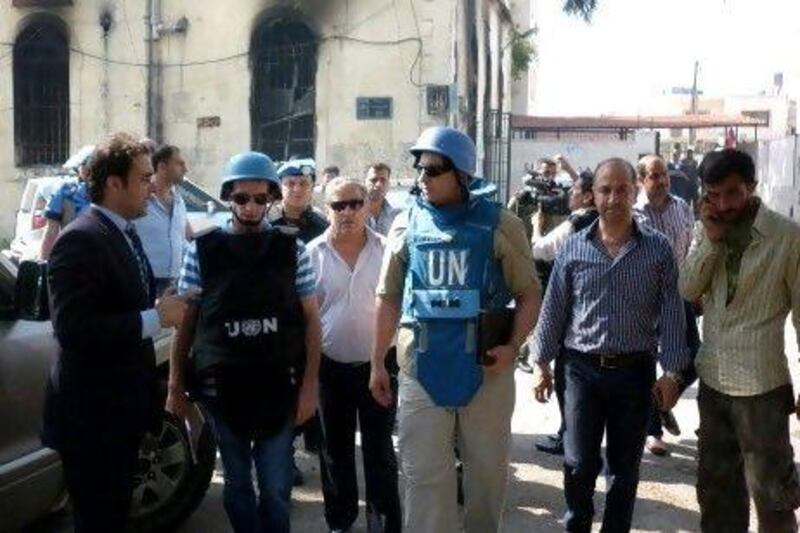Damascus // Two months after arriving and with their mission now suspended because of rising violence, United Nations observers in Syria have found themselves with few friends, sidelined in an increasingly divided and hostile environment.
Supporters of the president, Bashar Al Assad, and the opposition trying to topple his regime have both been critical of the 300 unarmed monitors, accusing them of ineffectiveness or, worse, aiding their enemy.
The monitors' convoys have come under attack from pro-regime forces and rebels, according to UN officials. Their distinctive armoured white jeeps have been shot at, bombed and smashed by iron-bar wielding gangs.
On Saturday, General Robert Mood, the veteran UN peacekeeper in charge of the mission, announced patrols would be halted until further notice, citing risks to his team members and a "lack of willingness" by the Syrian authorities and opposition to seek a peaceful political solution.
"This isn't government policy. I know officially we support the UN mission, but from my point of view as a soldier, the observers are helping Al Qaeda," said a Syrian army officer commanding a small outpost on the edge of Deraa, 100 kilometres south of Damascus.
He said the small, lightly defended camp held by his troops came under regular attack by rebels from the Free Syrian Army - called terrorists by the Syrian authorities - and that conditions had deteriorated since the UN observers deployed to Deraa city in April.
"The monitors might as well be working for Al Qaeda. They have made it harder for us to go after the terrorists and made it easier for the terrorists to attack us," the soldier said.
"They're helping the terrorists set up safe areas. They've not helped the situation at all, they've made it worse," he said.
Inside Deraa, where the Syrian uprising began more than 15 months ago, residents said the presence of UN monitors, based in the city's fortified White Rose Hotel, close to key government buildings, had not prevented an escalation in violence.
"I don't feel any safer because the observers are here," said a man in his early 30s. "Perhaps if there were more of them and they were in all the neighbourhoods we would feel safer."
He said since the observers' arrival, security forces had begun to fire mortars into residential areas where the population supports the uprising, something they had not done before.
"The problem is we don't want the observers just to be witnesses to what's going on. We want them to be able to stop it and they can't," he said.
In Damascus, Syria's increasingly dangerous capital, those on each side of a polarised society made similar complaints.
"Before the observers came, the government was getting the situation under control but now that has all reversed," said a 23-year-old supporter of Mr Al Assad who angrily accused the UN of bias against Syria.
"It is part of the international conspiracy we are facing," he said. "The UN isn't neutral like we thought it would be. It is against us, it is with the terrorists, we don't want them here any more."
He said government troops had stuck to Kofi Annan's ceasefire plan but had been left with no choice but to fight because armed rebels were using the monitors as a shield.
"The regime has been very patient and stopped its military operations for the observers and the terrorists used that as a chance to get more weapons and grow stronger. How is that going to help Syria achieve peace?" he said.
In Douma, on the north-eastern edge of Damascus, activists said any hope they had the UN teams would end more than a year of bloodshed had been quickly shattered.
"The first time they came here we were happy to see them but, as soon as they left, the shooting started," said an activist in the suburb. "Now we realise they don't do anything. They come and stand around for half an hour or so and then they leave and nothing has changed. It's as if they are not here at all."
Suspicion of the monitors runs high. Opposition groups say the fact that observer teams in Damascus are guided by an official from the foreign ministry and closely followed by state-run media inherently compromises their work, although neither enters opposition-held areas when the monitors go in.
"The expectations of what a small number of unarmed observers could do were just unrealistic, there was no way they were going to be able to make peace under these circumstances," said a Syrian analyst.
"Actually they have an impossible job and have satisfied neither side although their work as reliable witnesses has been very important. But in terms of a peace plan or ceasefire, they were sent here too late.
"A year or six months ago they might have been able to avert a war, but now they cannot stop it."





